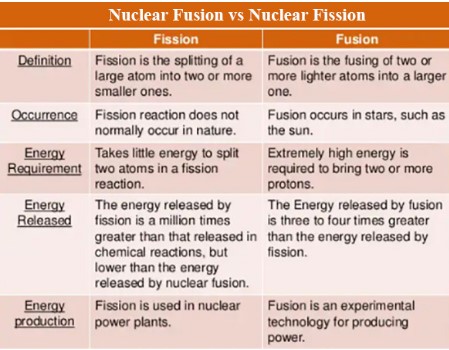Nuclear fusion
2022 FEB 10
Preliminary >
Science and Technology > Energy > Nuclear energy

Why in news?
- A team at the Joint European Torus (JET) facility in the United Kingdom said they have achieved a new milestone in producing nuclear fusion energy, or imitating the way energy is produced in the Sun.
What is Nuclear Fusion?
- Nuclear fusion is a reaction through which two or more light nuclei collide to form a heavier nucleus.
- The nuclear fusion process occurs in elements that have a low atomic number, such as hydrogen.
- Nuclear Fusion is the opposite of nuclear fission reaction in which heavy elements diffuse and form lighter elements.
- Both nuclear fusion and fission produce a massive amount of energy.
Significance in energy generation:
- Energy by nuclear fusion is one of mankind’s long standing quests as it promises to be low carbon, safer than how nuclear energy is now produced and, with an efficiency that can technically exceed a 100%.
- A kg of fusion fuel contains about 10 million times as much energy as a kg of coal, oil or gas.
- The fusion reactors will not produce high-level nuclear wastes like their fission counterparts, so that disposal will be less of a problem.
- The wastes will not be of weapons-grade nuclear materials as is the case in fission reactors.
- In addition, the fuel for fusion, Deuterium, and Tritium, are also readily available in nature.
Nuclear Fusion in the Universe
- Every star in the universe, including the sun, is alive due to nuclear fusion.
- It is through this process that they produce an enormous amount of heat and energy.
- The pressure at the core of any star is tremendously high, and that is where the nuclear fusion reaction occurs.
PRACTICE QUESTION:
Consider the following statements regarding nuclear energy:
1. The fusion reactors will not produce high-level nuclear wastes like their fission counterparts
2. Fusion doesn't emit harmful toxins like carbon dioxide or other greenhouse gases into the atmosphere
Which of the statements given above is/are correct?
(a) 1 only
(b) 2 only
(c) Both 1 and 2
(d) Neither 1 nor 2
Answer
